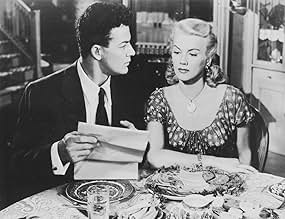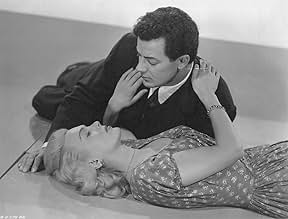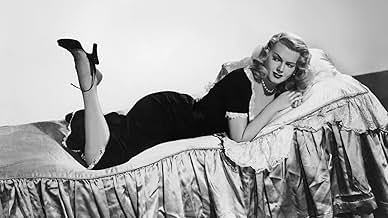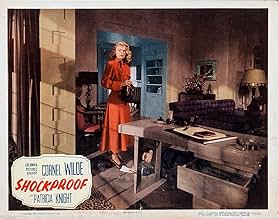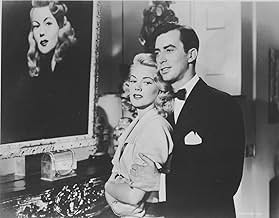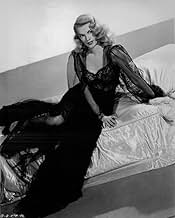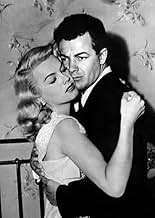IMDb रेटिंग
6.5/10
2.7 हज़ार
आपकी रेटिंग
अपनी भाषा में प्लॉट जोड़ेंA parole officer falls in love with his client, a ravishing blonde who served time for murder, and he's determined to help her go straight despite her interfering criminal boyfriend.A parole officer falls in love with his client, a ravishing blonde who served time for murder, and he's determined to help her go straight despite her interfering criminal boyfriend.A parole officer falls in love with his client, a ravishing blonde who served time for murder, and he's determined to help her go straight despite her interfering criminal boyfriend.
Shirley Adams
- Emmy
- (बिना क्रेडिट के)
Gilbert Barnett
- Barry
- (बिना क्रेडिट के)
Richard Benedict
- 'Kid' - Knife Wielder
- (बिना क्रेडिट के)
Paul Bradley
- Airline Clerk
- (बिना क्रेडिट के)
Argentina Brunetti
- Stella
- (बिना क्रेडिट के)
Paul Bryar
- Man in Car
- (बिना क्रेडिट के)
John Butler
- Sam Green, Pawnbroker
- (बिना क्रेडिट के)
Claire Carleton
- Florrie Kobiski
- (बिना क्रेडिट के)
Cliff Clark
- Mac - Police Lieutenant
- (बिना क्रेडिट के)
King Donovan
- Joe Wilson
- (बिना क्रेडिट के)
Al Eben
- Joe Kobiski
- (बिना क्रेडिट के)
फ़ीचर्ड समीक्षाएं
It's difficult to believe, but even by this Early Date of 1949 the Cynicism and Doom Laden Tropes of Film-Noir were becoming unacceptable for the Safe and Conservative Studio Heads. Sam Fuller's Script was stripped of its edginess and coated with a sweetness Ending. Neither Fuller nor Director Douglas Sirk were pleased and voiced Their disapproval loudly.
But the Power of Low-Rung, untested Writers and Directors was Minimal. So what remains is a Soapy Triangle with enough Artistic Insight to be passable and somewhat enjoyable, but hardly Pure Film-Noir and the impact is diluted and disappointing.
Cornel Wilde as the Parole Officer and Patricia Knight have and unexpected collision of Love's vice like grip and its ability to change People drastically. John Barangay as the Ex-Lover is Bland and really doesn't do much to attract audiences to His vile villainy but is good enough.
Wilde, not the best Actor in the World does have a Physical Presence and was Drop Dead Handsome. Knight was as Stiff as They Come and had a limited Career and tries mightily here but was betrayed by Her Talent and got by on Her slightly Off-Beat Beauty.
Overall, Worth a Watch for Sirk and Fuller, but must be Footnoted as mishandled by Studio Interference. Film-Noir Fans and Fuller Cultists might be disappointed. A Film-Noir only in a Wide Definition of the Genre.
But the Power of Low-Rung, untested Writers and Directors was Minimal. So what remains is a Soapy Triangle with enough Artistic Insight to be passable and somewhat enjoyable, but hardly Pure Film-Noir and the impact is diluted and disappointing.
Cornel Wilde as the Parole Officer and Patricia Knight have and unexpected collision of Love's vice like grip and its ability to change People drastically. John Barangay as the Ex-Lover is Bland and really doesn't do much to attract audiences to His vile villainy but is good enough.
Wilde, not the best Actor in the World does have a Physical Presence and was Drop Dead Handsome. Knight was as Stiff as They Come and had a limited Career and tries mightily here but was betrayed by Her Talent and got by on Her slightly Off-Beat Beauty.
Overall, Worth a Watch for Sirk and Fuller, but must be Footnoted as mishandled by Studio Interference. Film-Noir Fans and Fuller Cultists might be disappointed. A Film-Noir only in a Wide Definition of the Genre.
If the movie were an airplane, then it wobbled a lot before finally crashing and burning with an utterly illogical ending. Up to that point, this crime drama is mediocre at best. The best part follows the couple (Wilde and Knight) as they flee the cops after running out on Knight's parole and in the process sinking into society's lower depths. That 20 minute sequence is done with both flair and zip.
Director Douglas Sirk is known for artistic soap opera, so it's not surprising that this film emphasizes the love story over the crime element. The trouble is that Wilde is woodenly uninvolving, while Knight's character remains muddled, to say the least. A key part of the plot lies in tracking her evolving emotions. But that's hard to do since these developments are confusingly portrayed, helped neither by the turgid script nor by Knight's thespic limitations. Apparently cult movie-maker Sam Fuller co-authored some of the screenplay, which, on the face of it, seems hard to believe. Nonetheless, I'm sure he had nothing to do with the ridiculous climax that instead smacks of outside interference of the most thoughtless kind.
Calling this a noir film is, I think, a stretch. It's certainly not filmed as noir, with none of the usual trademark light and shadow. True, the plot contains a number of noirish elements, but Sirk's style doesn't bring these out in recognizably noir fashion. Even so, the many SoCal location shots are both entertaining and appropriate for crime drama. (Too bad we don't get more of the dingy oil field setting, which has definite and exotic noir potential.) But noir or not, this is a rather poorly done crime drama, having neither the force nor the panache of the better examples of the period. With better casting, a more cogent screenplay, and more attention to the oil field, this could have been a memorable film.
Director Douglas Sirk is known for artistic soap opera, so it's not surprising that this film emphasizes the love story over the crime element. The trouble is that Wilde is woodenly uninvolving, while Knight's character remains muddled, to say the least. A key part of the plot lies in tracking her evolving emotions. But that's hard to do since these developments are confusingly portrayed, helped neither by the turgid script nor by Knight's thespic limitations. Apparently cult movie-maker Sam Fuller co-authored some of the screenplay, which, on the face of it, seems hard to believe. Nonetheless, I'm sure he had nothing to do with the ridiculous climax that instead smacks of outside interference of the most thoughtless kind.
Calling this a noir film is, I think, a stretch. It's certainly not filmed as noir, with none of the usual trademark light and shadow. True, the plot contains a number of noirish elements, but Sirk's style doesn't bring these out in recognizably noir fashion. Even so, the many SoCal location shots are both entertaining and appropriate for crime drama. (Too bad we don't get more of the dingy oil field setting, which has definite and exotic noir potential.) But noir or not, this is a rather poorly done crime drama, having neither the force nor the panache of the better examples of the period. With better casting, a more cogent screenplay, and more attention to the oil field, this could have been a memorable film.
Real life husband and wife Cornel Wilde and Patricia Knight star as parole officer / parolee in this quasi noirish post-war drama. Wilde, who is assigned as Knight's parole officer, insists that as a condition of her parole she no longer associate with her former boyfriend, unsavory gambler (John Baragrey). Wilde who is smitten almost immediately by Knight, begins to bend the rules as Knight ignores the conditions of her parole and continues to see Baragrey. Because of her parole violations, Wilde being a concerned officer of the court, suggests Knight move into his home that he shares with his blind, widowed mother and younger brother. The situation continues on a downward trend.
Written by hard edged, cigar chomping, World War II vet Samuel Fuller and directed by melodrama master Douglas Sirk, this movie is a contrast of styles between writer and director. In this case the director Sirk called the shots. With the assist of a script revision from Helen Deutsch (I'll Cry Tomorrow, Valley of the Dolls), Sirk plays it out more as a tortured romantic triangle with dribs and drabs of writer Fuller's permeating cynicism occasionally popping through.
Despite a title suggesting more lurid content, 'Shockproof' offers little to actually be shocked by, probably because of the lack of any real criminal intent by the characters beyond parole violations. What tension this movie engenders is more human conflict from the soap opera style re-draft by Deutsch. With a script basically hollowed from Fuller's fatalistic influence, what's left is a sort of a well-crafted but tepid potboiler complete with a contrived populist ending.
'Shockproof' isn't a bad movie just more of a disappointment of what could have been.
Written by hard edged, cigar chomping, World War II vet Samuel Fuller and directed by melodrama master Douglas Sirk, this movie is a contrast of styles between writer and director. In this case the director Sirk called the shots. With the assist of a script revision from Helen Deutsch (I'll Cry Tomorrow, Valley of the Dolls), Sirk plays it out more as a tortured romantic triangle with dribs and drabs of writer Fuller's permeating cynicism occasionally popping through.
Despite a title suggesting more lurid content, 'Shockproof' offers little to actually be shocked by, probably because of the lack of any real criminal intent by the characters beyond parole violations. What tension this movie engenders is more human conflict from the soap opera style re-draft by Deutsch. With a script basically hollowed from Fuller's fatalistic influence, what's left is a sort of a well-crafted but tepid potboiler complete with a contrived populist ending.
'Shockproof' isn't a bad movie just more of a disappointment of what could have been.
The title is ponderous - There are no "shocks" in this film or anything that would need you to be resistant to them. Just a catchy irrelevant title I guess.
Griff Marat ( Cornell Wilde) is a straight arrow of a parole officer with political ambitions. His latest charge is a woman, Jenny Marsh (Patricia Knight) who has just left prison after five years. Griff gets her a room and a job, but most importantly tells her she cannot see her old friends anymore, in particular, Harry Weeson, the man she killed for. But she is very beholden to Harry because he has waited these five years for her. Griff says that if he has waited that long he can wait awhile longer.
So you have young handsome single Griff, from an ethnic background that marries young, that can't afford any scandal if he wants to go up in the world. You have confused but beautiful Jenny who feels obliged to somebody she did time for. Shouldn't it be the other way around? And Weeson is hard to figure out. He's more of a professional gambler than a mobster, doesn't appear to be cheating on Jenny, and I never could figure out exactly what he wanted from her.
The killing Jenny did is never explained. If she was defending Weeson's life, why was it a crime? If it was her just killing somebody who was a nuisance to him, why is she out in only five years? Actress Patricia Knight is believable in this role, and although she is Wilde's wife at the time, she also looks much like Douglas Sirk favorite, Dorothy Malone, minus Malone's electricity. The reason I bring that up is Sirk directed this film.
The first 60% of the film really has no surprises. It took one of several paths I saw it taking from the start. But then the last third is really out in left field with Griff abandoning everything I thought that made him tick and with him showing himself to be much more wily than I thought him capable.
There is one really shocking scene when one parolee is told he is going back to prison. He begs to differ in a big way. It's definitely a Fuller touch - Sam Fuller wrote the script. But as for that ending, somebody must have locked Fuller in a broom closet and rewrote whatever ending he proposed. I'd recommend this one just because it is so very odd.
Griff Marat ( Cornell Wilde) is a straight arrow of a parole officer with political ambitions. His latest charge is a woman, Jenny Marsh (Patricia Knight) who has just left prison after five years. Griff gets her a room and a job, but most importantly tells her she cannot see her old friends anymore, in particular, Harry Weeson, the man she killed for. But she is very beholden to Harry because he has waited these five years for her. Griff says that if he has waited that long he can wait awhile longer.
So you have young handsome single Griff, from an ethnic background that marries young, that can't afford any scandal if he wants to go up in the world. You have confused but beautiful Jenny who feels obliged to somebody she did time for. Shouldn't it be the other way around? And Weeson is hard to figure out. He's more of a professional gambler than a mobster, doesn't appear to be cheating on Jenny, and I never could figure out exactly what he wanted from her.
The killing Jenny did is never explained. If she was defending Weeson's life, why was it a crime? If it was her just killing somebody who was a nuisance to him, why is she out in only five years? Actress Patricia Knight is believable in this role, and although she is Wilde's wife at the time, she also looks much like Douglas Sirk favorite, Dorothy Malone, minus Malone's electricity. The reason I bring that up is Sirk directed this film.
The first 60% of the film really has no surprises. It took one of several paths I saw it taking from the start. But then the last third is really out in left field with Griff abandoning everything I thought that made him tick and with him showing himself to be much more wily than I thought him capable.
There is one really shocking scene when one parolee is told he is going back to prison. He begs to differ in a big way. It's definitely a Fuller touch - Sam Fuller wrote the script. But as for that ending, somebody must have locked Fuller in a broom closet and rewrote whatever ending he proposed. I'd recommend this one just because it is so very odd.
"Shockproof" is a 1949 Douglas Sirk film starring Cornel Wilde and Patricia Knight. Wilde is Griff Marat, who gets a paroled prisoner, Jenny Marsh (Knight) on his caseload. She refuses to give up the bad acquaintances that got her into trouble in the first place; this includes her old boyfriend, Harry (John Baragrey) whom she continues to meet secretly. Griff has taken Jenny into his home to care for his blind mother (Esther Minciotti), and over time, they fall in love. Though she's still pulled toward Harry, she balks when Harry wants her to convince Griff to marry her, a clear violation of his job ethics and her parole. Because Griff has political ambitions, they will then have them where they want him. Gradually Harry realizes that Jenny is not going to cooperate, and he ends up gravely injured. Griff and Jenny go on the run to avoid her arrest.
This is a pretty good noir with two heavyweights attached, Sirk, the director, and Sam Fuller, who co-wrote the script. Unfortunately, the characters aren't fleshed out enough so that we understand their sudden turnarounds - a man on the side of the law with political ambitions decides to throw it all out the window, marry a client secretly, and go on the run riding in boxcars and living in shacks because though the shooting was accidental, Griff feels Jenny won't be believed. That's just Griff - in reality, all three of the main characters do complete reversals during the course of this film with little or no justification.
Wilde does a good job here, and Knight, a new actress to me, is beautiful and has good chemistry opposite her then husband Wilde. She didn't work much longer, as after their divorce, her career dried up.
Entertaining.
This is a pretty good noir with two heavyweights attached, Sirk, the director, and Sam Fuller, who co-wrote the script. Unfortunately, the characters aren't fleshed out enough so that we understand their sudden turnarounds - a man on the side of the law with political ambitions decides to throw it all out the window, marry a client secretly, and go on the run riding in boxcars and living in shacks because though the shooting was accidental, Griff feels Jenny won't be believed. That's just Griff - in reality, all three of the main characters do complete reversals during the course of this film with little or no justification.
Wilde does a good job here, and Knight, a new actress to me, is beautiful and has good chemistry opposite her then husband Wilde. She didn't work much longer, as after their divorce, her career dried up.
Entertaining.
क्या आपको पता है
- ट्रिवियाThis film features the iconic Bradbury Building at 304 S. Broadway as the location of Griff Marat's office. Out of his office window can be seen the old Hall of Records Building at 220 N. Broadway (demolished 1973), which is about 0.4 miles away.
- गूफ़When Sam Brooks comes into Griff's office, he leaves the door open. After he reads the folder and leaves the door is closed without him ever closing it.
- भाव
Jenny Marsh: I'm no longer asking you to say goodbye. I'm just saying it!
- क्रेज़ी क्रेडिटFollowing the opening credits the camera pans onto the curb edge of the road which reads HOLLYWOOD BLVD.
- कनेक्शनFeatured in Behind the Mirror: A Profile of Douglas Sirk (1979)
टॉप पसंद
रेटिंग देने के लिए साइन-इन करें और वैयक्तिकृत सुझावों के लिए वॉचलिस्ट करें
- How long is Shockproof?Alexa द्वारा संचालित
विवरण
- रिलीज़ की तारीख़
- कंट्री ऑफ़ ओरिजिन
- भाषाएं
- इस रूप में भी जाना जाता है
- Los amantes
- फ़िल्माने की जगहें
- उत्पादन कंपनी
- IMDbPro पर और कंपनी क्रेडिट देखें
- चलने की अवधि1 घंटा 19 मिनट
- रंग
- पक्ष अनुपात
- 1.37 : 1
इस पेज में योगदान दें
किसी बदलाव का सुझाव दें या अनुपलब्ध कॉन्टेंट जोड़ें


